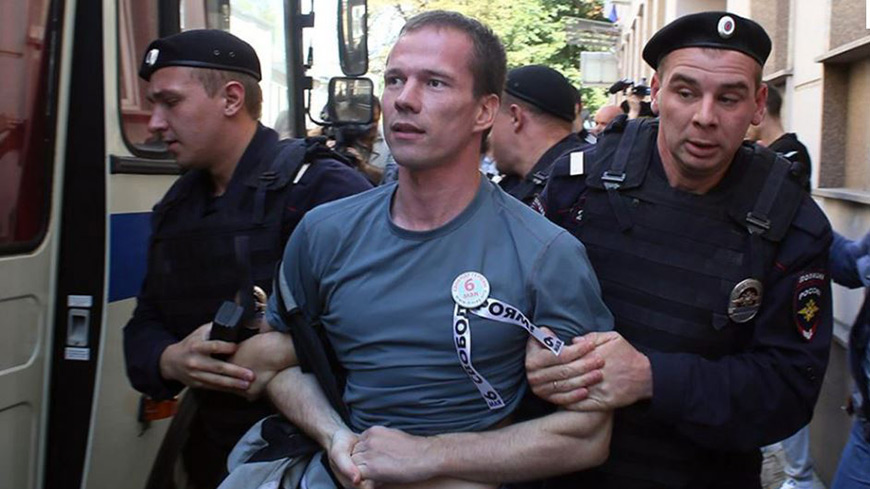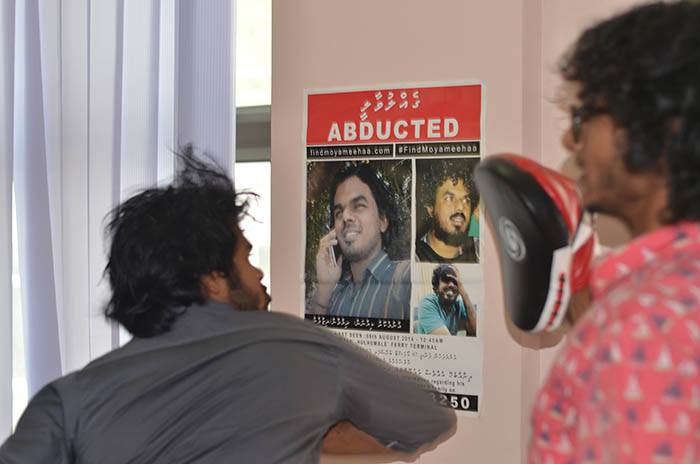17 Apr 2018 | Media Freedom, News
[vc_row][vc_column][vc_single_image image=”99700″ img_size=”full” add_caption=”yes” alignment=”center”][vc_column_text]Fifty-three Commonwealth heads of government are meeting for a summit in London this week. Lord Ahmad of Wimbledon, the UK Minister of State for the Commonwealth, lauded it as a unique network of 53 states with a responsibility to exert global influence based on a shared commitment to democracy, the rule of law and good governance as enshrined in the Commonwealth Charter of 2013.
But the record of Commonwealth countries concerning the rising number of killings of journalists — whose work holds a mirror up to the societies they live in – points to a dismal failure by the authorities in some member states to protect the lives of journalists targeted for their work. UN statistics also show that in all but a few cases the killers are shielded from facing justice by a climate of judicial impunity. Where is the rule of law in that?
In the five years from the start of 2013 to the end of 2017 as many as 57 journalists in Commonwealth countries were killed in the course of their work, according to UNESCO, the UN’s agency with a mandate to promote freedom of expression.
Most were killed to stop them from publishing reports into abuses of power, crime or corruption, often linked to public figures or law-enforcement officials. Among the recent shocking murders of journalists are those of editor and journalist Gauri Lankesh, shot outside her home in Bangalore, India last September, and Daphne Caruana Galizia, Malta’s best-known investigative journalist, killed in a car bombing one month later.
Yes, Commonwealth countries like India have pioneered some of the world’s most liberal Right to Information laws, and all member states are publicly committed to democratic standards including the separation of powers, independent courts and the rule of law.
Yet Commonwealth governments have evaded the chorus of demands for them to take determined actions to confront the pattern of violent assaults and other arbitrary actions aimed at silencing journalists and news media whose role is to inform the public. The London summit is the right time for them to put this on their agenda.
Luckily the Commonwealth has vigorous civil society organisations which already monitor cases of violence and intimidation against journalists and others who document abuses of civil and political rights. The Commonwealth Charter gives a mandate for strong action – despite the reluctance of some member states — by acknowledging the ‘surge in popular demands for democracy and human rights’.
UNESCO’s figures give this revealing breakdown of the 57 killings of journalists in Commonwealth countries in the five years up to the end of 2017: Pakistan 23, India 18, Bangladesh 8, Nigeria 3, and one each in Kenya, Malta, South Africa, Tanzania and Uganda.
Even more troubling, perhaps, is the picture that emerges from UNESCO’s records on the lack of effective judicial follow-ups in countries where journalists have been killed. The figures are based on states’ replies, made on a voluntary basis, to requests for information made by the Director-General of UNESCO after every verified killing.
The latest official report published by the Director-General of UNESCO recorded state authorities’ responses to killings of journalists during the ten-year period from 2006 to 2015. In that decade 104 journalists were killed in eight Commonwealth (including 9 journalists killed during Sri Lanka’s civil war up to 2009). Those statistics — based on information supplied by the governments concerned — fail to record a single case in which the perpetrators were brought to justice. Not one.
The figures are incomplete because too many states routinely fail to send back information about prosecutions, despite persistent requests from the Director-General of UNESCO. Further research shows that a handful of journalists’ killings in Commonwealth states have led to successful prosecutions – for example, in the cases of TV journalist Wali Khan Babar, killed in Pakistan in 2013, and Gautam Das, a Bangladeshi crime reporter killed in 2005.
A first step towards building confidence would be for all Commonwealth states to pledge to open investigations into the scores of unresolved cases and report any progress to the UN.
Journalists are only one of many categories of people who may face violence or persecution in Commonwealth countries, with all their diversity and ethnic and political tensions. But half a dozen United Nations resolutions adopted since 2012 have recognised that journalists face special dangers because of their work and deserve protection in order to counter corruption and abuses of democratic rights.
In advance of the London summit a coalition of grassroots Commonwealth professional organisations has come together to urge government leaders at the summit to face up to this stain on the organisation’s record. The Commonwealth Journalists Association joins the Commonwealth’s impressive networks of lawyers, legal educators, parliamentarians, academics and human rights advocates in putting forward a balanced and practical set of Commonwealth Principles on Freedom of Expression and the Role of the Media in Good Governance.
The Principles are written guidelines for democratic rules of engagement, so to speak, between the media and the parliament, judiciary and executive. The Principles will not be legally binding as Commonwealth states have made clear that would be anathema to them. But can at least serve as a manual of good practice to move the countries of the Commonwealth towards ending the scourge of impunity and fulfilling their public commitment to protect the media’s right to report on public affairs.
The heads of government meeting in London’s royal palaces this week should realise that if the Commonwealth cannot be part of the solution it may well be part of the problem.
[/vc_column_text][/vc_column][/vc_row][vc_row][vc_column width=”1/4″][vc_icon icon_fontawesome=”fa fa-share-alt” color=”black” background_style=”rounded” size=”xl” align=”right”][/vc_column][vc_column width=”3/4″][vc_column_text]The Commonwealth Principles on freedom of expression and the role of the media in good governance was published on April 11. The signatory organisations are the CJA, the Institute of Commonwealth Studies, Commonwealth Lawyers Association, Commonwealth Legal Education Association, Commonwealth Human Rights Initiative and Commonwealth Parliamentary Association UK.[/vc_column_text][/vc_column][/vc_row][vc_row][vc_column][vc_basic_grid post_type=”post” max_items=”12″ style=”load-more” items_per_page=”4″ element_width=”6″ grid_id=”vc_gid:1523956946253-7cccb26e-7266-2″ taxonomies=”8996″][/vc_column][/vc_row]
21 Feb 2018 | News, Volume 46.04 Winter 2017
[vc_row][vc_column][vc_custom_heading text=”Close down freedom of expression for those you don’t like and you turn them into freedom-of-expression heroes, writes Jodie Ginsberg
“][vc_row_inner][vc_column_inner][/vc_column_inner][/vc_row_inner][/vc_column][/vc_row][vc_row][vc_column][vc_column_text]
This year marks the 80th anniversary of Kristallnacht, the two-day attack on Jews in Germany. Crystal Night – a glittering name for an evil event – was so dubbed because of the shards of glass that littered the streets after synagogues and Jewish-owned shops and buildings were attacked. Scores of people were killed and tens of thousands of Jews were subsequently incarcerated.
In the decades since the end of World War II, such mass demonstrations of fascism have been rare, but it is chilling to consider Kristallnacht in the light of the 60,000 neo-Nazis who marched openly through Warsaw in November 2017, or the Unite the Right rally in Charlottesville, USA, earlier in the year in which a counter-protester was killed.
As white supremacists become more visible, and vocal, demands have grown for those who espouse such views to be silenced. And as that happens, the band of people who champion freedom of speech for everyone – regardless of their views – diminishes. The far-right have stepped into that gap, with devastating consequences for free speech and for those who (genuinely) advocate it.
Let’s be clear about this: The far-right are not in favour of free speech. The far-right – the likes of Richard Spencer, who leads a US white supremacist think tank – are in favour of protecting the speech of their own interest group, not the speech of those who oppose them, nor those whose human rights – and very existence – they openly challenge.
But calls from their opponents for Spencer or controversial columnist Katie Hopkins to be silenced has allowed these individuals to set themselves up as the champions and protectors of free speech. And when the only public advocates for free speech are a bunch of neo-Nazis, who wants to defend free speech as a principle?
We must push back. Freedom of expression is a freedom that benefits everybody. The First Amendment is what allowed not only the Unite the Right movement to march in Charlottesville, but gave the thousands of opponents who turned out to vocally oppose the march the chance to do so publicly. Once you accept the principle that only certain voices can be heard, it can be applied to your voice just as easily.
The narrative that suggests publicising the views of the far-right leads directly to much wider violence is steeped in popular narratives, primarily around the Holocaust and the belief that the public airing of such views led directly to Kristallnacht and the subsequent horrors of Nazi Germany.
[/vc_column_text][/vc_column][/vc_row][vc_row][vc_column width=”1/4″][vc_icon icon_fontawesome=”fa fa-quote-left” color=”custom” align=”right” custom_color=”#dd3333″][/vc_column][vc_column width=”3/4″][vc_custom_heading text=”Joseph Goebbels, Theodor Fritsch and Julius Streicher were all prosecuted for anti-Semitic speech” google_fonts=”font_family:Libre%20Baskerville%3Aregular%2Citalic%2C700|font_style:400%20italic%3A400%3Aitalic”][/vc_column][/vc_row][vc_row][vc_column][vc_column_text]
But as prominent Danish journalist and editor Flemming Rose has said, this is based on false assumptions. People argue that if only the Weimar government had clamped down on the National Socialists’ verbal persecution of the Jews in the years prior to Hitler’s rise to power, then the Holocaust would never have happened.
Rose, who famously published cartoons of the Prophet Mohammed in 2005 when he was culture editor of Danish daily newspaper Jyllands-Posten, said:
“Contrary to what most people think, Weimar Germany did have hate-speech laws, and they were applied quite frequently. The assertion that Nazi propaganda played a significant role in mobilising anti-Jewish sentiment is, of course, irrefutable. But to claim that the Holocaust could have been prevented if only anti-Semitic speech and Nazi propaganda had been banned has little basis in reality. Leading Nazis such as Joseph Goebbels, Theodor Fritsch and Julius Streicher were all prosecuted for anti-Semitic speech.
“Pre-Hitler Germany had laws very much like the anti-hate laws of today, and they were enforced with some vigour.”
Trevor Phillips, founding chair, Equality and Human Rights Commission, said at the Battle of Ideas in London 2017: “What we have learnt in the last 150 years is that, ultimately, freedom of expression is the last and only defence of the minority in any society. When they have taken away everything else from you… the last thing they can take away is your voice. That was true about Sojourner Truth, it was true about the slaves in the Caribbean, it was true about the Jews in Europe. People can take everything away from you, what they cannot do, ultimately, unless physically, physically they obliterate you is take away your ability to express your pain, anger, frustration. So the defence of free speech on the grounds that it is somehow an offence to minorities simply flies in the face of every piece of human experience.”
Increasingly, though, I hear the argument that by allowing free speech we benefit only the powerful. That it is a tool that enriches only the privileged. That it is the armour which empowers the far-right and precedes violence, and that, therefore, we must curtail speech to protect those who are persecuted.
This ignores what a powerful and essential tool freedom of expression has been in freedom movements over the centuries: its role in the US civil rights movement of the 1960s or the drive for women’s rights, gay and lesbian rights and religious tolerance.
If we want to counter the persistent and growing narrative that free speech only benefits the privileged, and the far-right, we must raise up those voices who argue the contrary.
Index works with hundreds of writers, artists and campaigners who have experienced persecution as the minority and whose freedom of expression has been repeatedly curtailed. Atheists in Bangladesh who face death for voicing their views in an increasingly hardline Muslim state; political opponents in Bahrain tortured and jailed for criticising the government; gays in Uganda hounded for expressing their sexuality.
These are the voices we need to raise when people celebrate the value of denying speech to those with whom they disagree.
[/vc_column_text][/vc_column][/vc_row][vc_row][vc_column][vc_column_text]
Jodie Ginsberg is the CEO of Index on Censorship
[/vc_column_text][/vc_column][/vc_row][vc_row][vc_column][vc_custom_heading text=”From the Archives”][vc_row_inner][vc_column_inner width=”1/3″][vc_single_image image=”89095″ img_size=”213×300″ alignment=”center” onclick=”custom_link” link=”http://journals.sagepub.com/doi/pdf/10.1177/0306422013481709″][vc_custom_heading text=”What it means” font_container=”tag:p|font_size:24|text_align:left” link=”url:http%3A%2F%2Fjournals.sagepub.com%2Fdoi%2Fpdf%2F10.1177%2F0306422013481709|||”][vc_column_text]March 2013
Why does free expression matter? Journalists, artists and activists talk to Index about what free speech means to them.[/vc_column_text][/vc_column_inner][vc_column_inner width=”1/3″][vc_single_image image=”91052″ img_size=”213×300″ alignment=”center” onclick=”custom_link” link=”http://journals.sagepub.com/doi/pdf/10.1080/03064227508532452″][vc_custom_heading text=”Striking a balance” font_container=”tag:p|font_size:24|text_align:left” link=”url:http%3A%2F%2Fjournals.sagepub.com%2Fdoi%2Fpdf%2F10.1080%2F03064229208535375|||”][vc_column_text]July 1992
Helen Darbishire believes protecting victims of bigotry from verbal abuse is more likely to drive prejudice underground than to stamp it out.[/vc_column_text][/vc_column_inner][vc_column_inner width=”1/3″][vc_single_image image=”89174″ img_size=”213×300″ alignment=”center” onclick=”custom_link” link=”http://journals.sagepub.com/doi/pdf/10.1080/03064220802306838″][vc_custom_heading text=”Free speech for all” font_container=”tag:p|font_size:24|text_align:left” link=”url:http%3A%2F%2Fjournals.sagepub.com%2Fdoi%2Fpdf%2F10.1080%2F03064220802306838|||”][vc_column_text]August 2008
Aryeh Neier recalls landmark First Amendment case and believes hate speech will take place but will be countered in an effective form.[/vc_column_text][/vc_column_inner][/vc_row_inner][vc_separator][/vc_column][/vc_row][vc_row content_placement=”top”][vc_column width=”1/3″][vc_custom_heading text=”What price protest?” font_container=”tag:p|font_size:24|text_align:left” link=”url:https%3A%2F%2Fwww.indexoncensorship.org%2F2017%2F12%2Fwhat-price-protest%2F|||”][vc_column_text]In homage to the 50th anniversary of 1968, the year the world took to the streets, the winter 2017 issue of Index on Censorship magazine looks at all aspects related to protest.
With: Micah White, Ariel Dorfman, Robert McCrum[/vc_column_text][/vc_column][vc_column width=”1/3″][vc_single_image image=”96747″ img_size=”medium” alignment=”center” onclick=”custom_link” link=”https://www.indexoncensorship.org/2017/12/what-price-protest/”][/vc_column][vc_column width=”1/3″ css=”.vc_custom_1481888488328{padding-bottom: 50px !important;}”][vc_custom_heading text=”Subscribe” font_container=”tag:p|font_size:24|text_align:left” link=”url:https%3A%2F%2Fwww.indexoncensorship.org%2Fsubscribe%2F|||”][vc_column_text]In print, online. In your mailbox, on your iPad.
Subscription options from £18 or just £1.49 in the App Store for a digital issue.
Every subscriber helps support Index on Censorship’s projects around the world.
 SUBSCRIBE NOW[/vc_column_text][/vc_column][/vc_row]
SUBSCRIBE NOW[/vc_column_text][/vc_column][/vc_row]
9 Nov 2017 | Asia and Pacific, Awards, China, Europe and Central Asia, Fellowship, Fellowship 2017, Maldives, News, Russia, Turkey
[vc_row][vc_column][vc_column_text]

From left: Cartoonist Martin Rowson accepting the Arts Award on behalf of Chinese cartoonist Rebel Pepper; Alp Toker of Digital Activism Award-winner Turkey Blocks; Isik Mater of Digital Activism Award-winner Turkey Blocks; Anastasia Zotova, wife and campaign partner of Campaigning Award-winner Ildar Dadin; Ahmed Naish, deputy editor of Journalism Award-winning Maldives Independent; Zaheena Rasheed, former editor of Journalism Award-winning Maldives Independent. (Photo: Elina Kansikas for Index on Censorship)
Since the Index on Censorship Awards, the 2017 fellows have been busy doing important work in their respective fields to further their cause and for stronger freedom of expression around the world.
Rebel Pepper / Arts

Baby Pepper
Rebel Pepper, the Chinese cartoonist critical of the country’s government, now lives in exile in the USA where he works for Radio Free Asia. “Everything is going well, and I have a lot of friendly colleagues who like my work,” he told Index on Censorship.
He also continues to write his column in the Japanese version of Newsweek and worries about many recent developments in his home country. “The CCP’s control of society is becoming more and more severe, people are exposed to less and less real news from the outside world, and vice versa,” he says. “It’s hard to sum up because there are so many problems right now.”
The artist is still getting cartoons published and says the Index on Censorship award gave him the energy to “keep walking on the creative road”.
There is a new addition to the Rebel Pepper family, with baby Kitano. “Every day I have to change a lot of diapers, which has had a big influence on my sleeping patterns, so I have to find some fun from him,” Rebel Pepper tells Index, brandishing a cartoon to illustrate his point.

Idler Dadin / Campaigning
Campaigning fellow Ildar Dadin has returned to activism since his release from prison in February. “Along with friends or on single pickets, we are openly showing that we aren’t in agreement with what’s happening in the country,” Dadin tells Index.
Last month he was detained in St Petersburg while trying to film a woman being assaulted by police. “The situation in this country now is really bad,” Dadin says. “There’s a new kind of police force which can attack and humiliate people, which is very serious.”

He describes the arrests of more than 260 people during anti-Putin protests across Russia — including St Petersburg — in October as “pretty much normal for any activist in the country”.
Dadin believes that pressure from civil society both in Russia and abroad were partially responsible for his release. He hopes for “justice for all people, not just Russians”.
Moving forward, Index is helping Dadin with his transition to life outside of prison and prioritising his health and also helping him to gain additional international exposure.
Turkey Blocks / Digital Activism
“We are now going to be the NetBlocks project and expand our work,” director of research at Turkey Blocks Isik Mater tells Index. The team are taking steps to formalise some of their tools and methodologies, expand into new regions that have similar needs and now cover several countries experimentally.
The Turkey Blocks team have also developed a new tool called Cost, which calculates the financial impact of mass-censorship. “Governments don’t tend to care about the human rights argument, so they don’t listen to it,” says Alp Toker, founder of Turkey Blocks. “But if you tell them ‘this will cost x million dollars of harm to GDP’ then they perk up because that can become a political issue, which is a very powerful method of convincing governments not to censor content.”
Turkey, however, has been quite quiet recently in terms of internet shutdowns, after a barrage of such incidents in the year following the attempted coup in July 2016. In fact, the Turkish government have been using Turkey Blocks data on internet shutdowns as a kind of audit, Toker explains. “We ran our first panel with the Turkish government just a few weeks ago, which is kind of historic,” he says. “We are seeing really positive things, and although they have a long way to go it should be noted that they’ve been willing to have a dialogue with civil society and with a human rights group.”
Index on Censorship is helping Turkey Blocks through the process of forming a board and incorporating public speaking training skills for Mater so that she too can begin to make more public appearances.
Maldives Independent / Journalism

Staff at the Maldives Independent taking part in self-defence training.
Journalism fellows at Maldives Independent are going through a period of change. Former editor Zaheena Rasheed left the publication soon after awards week in London to take up a position on the online team at Al Jazeera, where she has recently been doing a lot of work covering the Rohingya refugee crisis from Bangladesh.
For personal reasons, Rasheed finds it difficult to be involved with the Maldives on top of this. “A friend of ours in the Maldives, Yameen Rasheed, was murdered at the end of the Index awards week in London and that was a big blow — it was very hard for me.”
Yameen Rasheed was a prominent blogger and internet activist who died from multiple stab wounds after an attack in the stairway of his apartment building in Malé on Sunday 23 April 2017. Index on Censorship has been involved in helping the Maldives Independent better secure their personal and office safety since Yameen Rasheed’s murder, including a recent self-defence training session.
A new editor took over at the Maldives Independent in mid-September and since then the publication has seen a noticeable spike in readership, and reporters are encouraged to get out and meet people, build relationships and contacts.
“It’s fairly calm at the moment — there have been no coups, for example — so I see this period as a time to hone the team’s reporting and feature writing skills,” a staff member tells Index. “We’re doing a broad mix of news and features: politics, tourism, mental health, rave culture, the hipster coffee scene, rural development, sex abuse cover-ups.”
Staff at the Maldives Independent hope that the publication continues to be a forum for debate and free speech, that it holds power to account, exposes wrongdoing and corruption and most of all give insight into a country that many people have only one image of.
[/vc_column_text][/vc_column][/vc_row][vc_row][vc_column][vc_basic_grid post_type=”post” max_items=”4″ element_width=”6″ grid_id=”vc_gid:1510228913303-fd0d57c2-b760-1″][/vc_column][/vc_row]
6 Nov 2017 | Digital Freedom, News
[vc_row][vc_column][vc_column_text]
Facebook has received much criticism recently around the removal of content and its lack of transparency as to the reasons why. Although it maintains their right as a private company to remove content that violates community guidelines, many critics claim this disproportionately targets marginalised people and groups. A report by ProPublica in June 2017 found that Facebook’s secret censorship policies “tend to favour elites and governments over grassroots activists and racial minorities”.
The company claims in their community standards that they don’t censor posts that are newsworthy or raise awareness, but this clearly isn’t always the case.
The Rohingya people
Most recently, almost a year after the human rights groups’ letter, Facebook has continuously censored content related to the Rohingya people, a stateless minority who mostly reside in Burma. Rohingya have repeatedly been banned from Facebook for posting about atrocities committed against them. The story resurfaced amid claims that Rohingya people will be offered sterilisation in refugee camps.
Refugees have used Facebook as a tool to document the accounts of ethnic cleansing against their communities in refugee camps and Burma’s conflict zone, the Rakhine State. These areas range from difficult to impossible to be reached by reporters, making first-hand accounts so important.
Rohingya activists told the Daily Beast that their accounts are frequently taken down or suspended when they post about their persecution by the Burmese military.
Dakota Access Pipeline protesters
In September 2016 Facebook admitted removing a live video posted by anti-Dakota Access Pipeline activists in the USA. The video showed police arresting around two dozen protesters, although after the link was shared access was denied to viewers.
Facebook blamed their automated spam filter for censoring the video, a feature that is often criticised for being vague and secretive.
Palestinian journalists
In the same month as the Dakota Access Pipeline video, Facebook suspended the accounts of editors from two Palestinian news publications based in the occupied West Bank without providing a reason. There are no reports of the journalists violating the networking site’s community standards, but the editors allege their pages may have been censored because of a recent agreement between the US social media giant and the Israeli government aimed at tackling posts inciting violence.
Facebook later released a statement which stated: “Our team processes millions of reports each week, and we sometimes get things wrong.”
US police brutality
In July 2016 a Facebook live video was censored for showing the aftermath of a black man shot by US police in his car. Philando Castile was asked to provide his license and registration but was shot when attempting to do so, according to Lavish Reynolds, Castile’s girlfriend who posted the video.
The video does not appear to violate Facebook’s community standards. According to these rules, videos depicting violence should only be removed if they are “shared for sadistic pleasure or to celebrate or glorify violence”.
“Facebook has long been a place where people share their experiences and raise awareness about important issues,” the policy states. “Sometimes, those experiences and issues involve violence and graphic images of public interest or concern, such as human rights abuses or acts of terrorism.”
Reynold’s video was to condemn wrongful violence and therefore was appropriate to be shown on the website.
Facebook blamed the removal of the video on a glitch.
Swedish breast cancer awareness video
In October 2016, Facebook removed a Swedish breast cancer awareness campaign that had depictions of cartoon breasts. The breasts were abstract circles in different shades of pinks. The purpose of the video was to raise awareness and to educate, meaning that by Facebook’s standards, it should not have been censored.
The video was reposted and Facebook apologised, claiming once again that the removal was a mistake.
The Autumn issue of Index on Censorship magazine explored the censorship of the female nipple, which occurs offline and on in many areas around the world. In October 2017 a Facebook post by Index’s Hannah Machlin on the censoring of female nipples was removed for violating community standards.
“Napalm girl” Vietnam War photo
 A month earlier, in a serious blow to media freedom, Facebook removed an iconic photo from the Vietnam War. The photo is widespread and famous for revealing the atrocities of the war, especially on innocent people like children.
A month earlier, in a serious blow to media freedom, Facebook removed an iconic photo from the Vietnam War. The photo is widespread and famous for revealing the atrocities of the war, especially on innocent people like children.
In a statement made following the removal of the photograph, Index on Censorship said: “Facebook should be a platform for … open debate, including the viewing of images and stories that some people may find offensive, is vital for democracy. Platforms such as Facebook can play an essential role in ensuring this.”
The newspaper whose post was censored posted a front-page open letter to Mark Zuckerberg stating that the CEO was abusing his power. After public outrage and the open letter, Facebook released a statement claiming they are “always looking to improve our policies to make sure they both promote free expression and keep our community safe”.
Facebook’s community standards claim they remove photos of sexual assault against minors but don’t mention historical photos or those which do not contain sexual assault.
The young woman shown in the photo, who now lives in Canada, released her own statement saying: “I’m saddened by those who would focus on the nudity in the historic picture rather than the powerful message it conveys. I fully support the documentary image taken by Nick Ut as a moment of truth that capture the horror of war and its effects on innocent victims.”[/vc_column_text][/vc_column][/vc_row][vc_row][vc_column][vc_basic_grid post_type=”post” max_items=”4″ element_width=”6″ grid_id=”vc_gid:1509981254255-452e74e2-3762-2″ taxonomies=”1721″][/vc_column][/vc_row]







 A month earlier, in a serious blow to media freedom, Facebook
A month earlier, in a serious blow to media freedom, Facebook